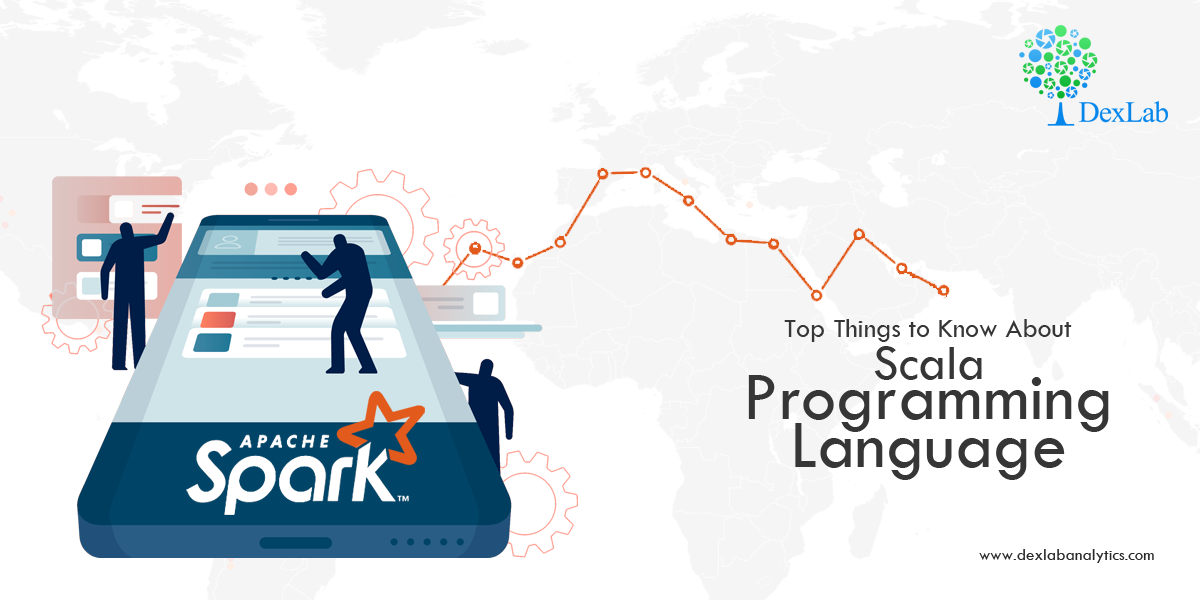
Scalable Language, Scala is a general-purpose programming language, both object-oriented and highly functional programming language. It is easy to learn, simple and aids programmers in writing codes in a simple, sophisticated and type-safe manner. It also enables developers and programmers in being more productive.
Even though Scala is a relatively new language, it has garnered enough users and has wide community support – because it’s touted as the most user-friendly language.
About Scala and Its Features
Scala is a completely object-oriented programming language
In Scala, everything is treated as an object. Even, the operations you conduct are termed as a method call. Scala lets you add new operations to already existing classes – thanks to the implicit classes.
One of the best things about Scala is that it makes it effortlessly easy to interact with Java code. You can easily write a Java code inside Scala class – interesting, isn’t it? The Scala makes way for hi-tech component architectures with the help of classes and traits.
Scala is a functional language
No wonder, Scala has implemented top-notch functional programming concepts – in case you don’t know, in functional programming, each and every computation is regarded as a mathematical function. Following are the characteristics of functional programming:
- Simplicity
- Power and flexibility
- Suitable for parallel processing
Not interpreted, Scala is a compiler-based language
As Scala is a compiler based language, its execution is relatively faster than its tailing competitor, Python. The latter is an interpreted language. The compiler in Scala functions just like a Java compiler. It taps the source code and launches Java byte-code that’s executable across any standard JVM (Java Virtual Machine).
Pre-requisites for Mastering Scala
Scala is a fairly simple programming language and there are minimal prerequisites for learning it. If you possess some basic knowledge of C/C++, you can easily start acing Scala. As it is developed upon Java, the fundamental programming functions of Scala are somewhat similar to Java.
Now, if you happen to know about Java syntax or OOPs concept, it would prove better for you to work in Scala.
Basic Scala Terms to Get Acquainted With
Object
An entity which consists of state and behavior is defined as an Object. Best examples – person, table, car etc.
Class
Described as a template or a blueprint for designing different objects that reflects its behavior and properties, a Class is a widely popular term.
Method
It is reckoned as a behavior of a class, where a class may include one or more methods. For example, a deposit can be reckoned as a method of bank class.
Closure
It is defined as any function that ends within the environment in which it’s defined. A closure return value is determined based on the value of one or more variables declared outside the closure.
Traits
These are used to determine object types by mentioning the signature of the supported methods. It is similar to a Java interface.
Things to Remember About Scala
- Scala is case sensitive
- When saving a Scala program, use “.scala”
- Scala execution process begins from main() methods
- Never can an identifier name start with numbers. For an instance, the variable name “789salary” is not valid.
Now, if you are interested in understanding the intricacies and subtle nuances of Apache Spark in detail, you have to enroll for Scala certification Training Gurgaon. Such intensive Scala training programs not only help you master the programming language but ensure secure placement assistance. For more information, reach us at DexLab Analytics, a premier Scala Training Institute in Gurgaon.
The blog has been sourced from ― www.analyticsvidhya.com/blog/2017/01/scala
Interested in a career in Data Analyst?
To learn more about Data Analyst with Advanced excel course – Enrol Now.
To learn more about Data Analyst with R Course – Enrol Now.
To learn more about Big Data Course – Enrol Now.To learn more about Machine Learning Using Python and Spark – Enrol Now.
To learn more about Data Analyst with SAS Course – Enrol Now.
To learn more about Data Analyst with Apache Spark Course – Enrol Now.
To learn more about Data Analyst with Market Risk Analytics and Modelling Course – Enrol Now.

Comments are closed here.